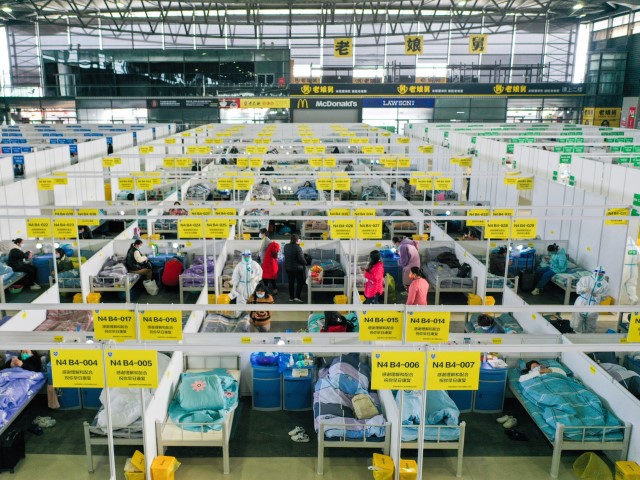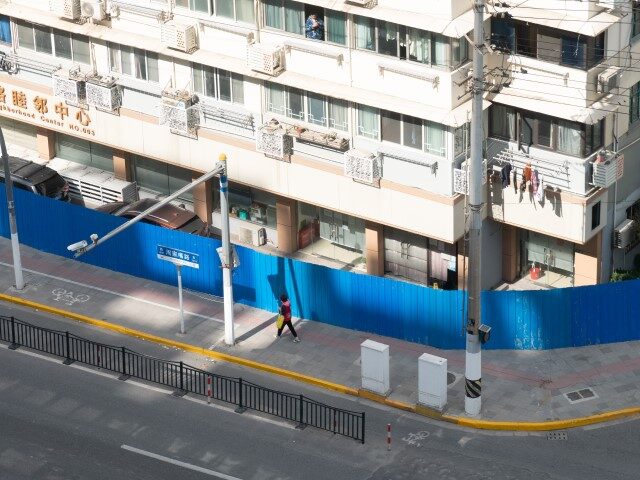Shanghai’s downtown Yangpu district, a primarily residential area that includes the campuses of Fudan and Tongji Universities, ordered mass testing for its 1.3 million residents on Friday and ordered them to remain in their homes – a chilling echo of the brutal two-month lockdown the entire city endured over the summer.
Shanghai residents have been terrified the lockdowns would return as a fresh wave of coronavirus infections allegedly spreads across China. The city’s May-June ordeal saw residents herded into dismal quarantine centers and separated from their children, imprisoned residents pleading for food and medicine, and even rare battles with police in the streets.
At first, there was some political turmoil within the Chinese Communist Party over the Shanghai lockdown horror, but when the city’s party chief Li Qiang was promoted to become dictator Xi Jinping’s number-two man at last week’s National Party Congress, Shanghai took it as a grim sign that more hardships could be coming its way.

Photo taken on April 1, 2022, shows the quarantine zone at the Shanghai New International Expo Center in east China’s Shanghai. It is Shanghai’s largest temporary quarantine venue for mild cases and asymptomatic carriers amid the latest COVID-19 resurgence and has a capacity of over 15,000 beds. (Ding Ting/Xinhua via Getty Images)
Apprehension grew in Shanghai throughout October as some residential compounds were locked down and residents noticed ominous stockpiles of rations being delivered to others.
“The practices and atmosphere all sound so familiar. The idea that my kids may need to have online class again and the family has to be stuck in the room all day makes me so sick. But let’s be realistic, I’ll stockpile some food now,” a Shanghai mother of two sighed as she spoke to Bloomberg News on October 10.
Voice of America News (VOA) reported on Friday that Shanghai is building a $221 million, 3,250-bed permanent quarantine center on Fuxing Island, located in the Huangpu River that runs through the city, a “sign China’s tough measures will be maintained in the long term.”
VOA suspected China’s mania for endless lockdowns was partially due to the Communist Party fearing that since its citizens have been locked down so often, its vaccines are “relatively ineffective,” and given the government does not mandate vaccination, China’s immense population has less immunity to Chinese coronavirus than most other nations. Any small outbreak of coronavirus cases could quickly become an embarrassing nationwide epidemic if quarantine procedures and travel restrictions are not swiftly imposed.
Bloomberg noted that Communist Party officials are so manic for lockdowns to prove their utter devotion to Xi’s “zero-Covid” policy that Yongji, a city of 400,000, locked down for three days in early October even though it reported zero coronavirus cases. The ostensible purpose of the citywide freeze was to prevent potentially infected travelers from returning home after party visits.
The more oppressed regions of China have been locked down for several weeks already. Street protests were caught on cell phone video this week in Lhasa, the administrative capital of the Tibetan Autonomous Region, which has been locked down for 77 consecutive days:
A rare protest in Lhasa against a harsh Covid-19 lockdown. Sources told RFA that Tibetan protesters warned Chinese officials against “setting off a fire” if Covid restrictions are not lifted. pic.twitter.com/oc5DI0Ioje
— Radio Free Asia (@RadioFreeAsia) October 26, 2022
The BBC reported censors are working to delete videos of the Tibet lockdown protests from Chinese social media, but the banned videos are reappearing on Twitter.
“People are locked at home every day and life is so hard. Prices in Lhasa now are so high, and landlords are chasing people for rent. The workers also aren’t allowed to go back to their hometown. They have no other way out,” one dismayed Lhasa resident said.
The BBC noted that while Beijing might be untroubled by the suffering of the oppressed Tibetans, a fair number of the people trapped in the Lhasa lockdown nightmare are Han Chinese migrant workers, and Chinese social media users are growing restless over how they have been treated.

COMMENTS
Please let us know if you're having issues with commenting.